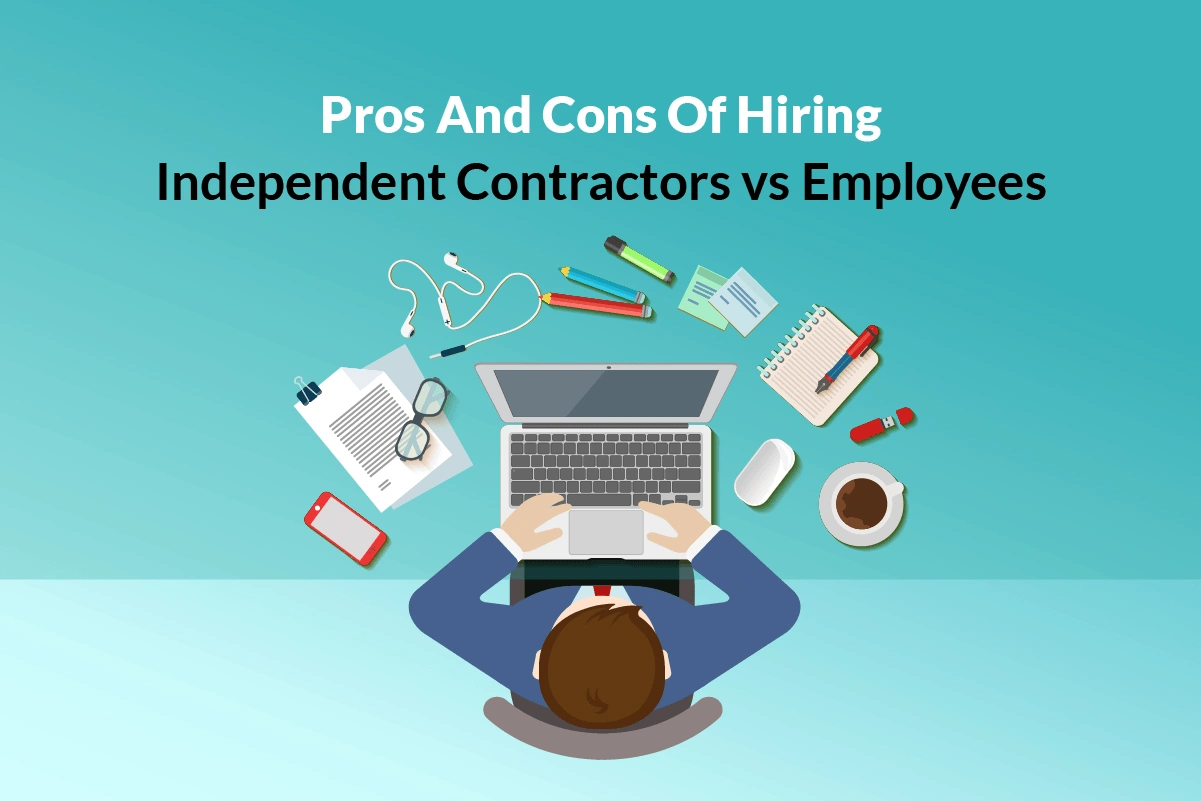Are you looking for more people to help your business achieve its goals? Are you struggling between hiring independent contractors vs. employees? As office dynamics evolve, more employers are considering alternative work arrangements and workforces that include full-time, part-time, and contractor employees.
Examining the pros and cons of hiring independent contractors vs. employees can help you make the best decision for your unique business needs.
Independent contractors and employees can work together and perform the same tasks. However, there are stark contrasts between the two types of workers regarding employer control, tax requirements, and labor laws.
What is an Employee?
At the most basic level, it can help to establish what it means to be an employee; an employee is someone an employer hires to perform a particular job. These individuals have been recruited through various sources depending on the nature of their work.

Employees work with and under the supervision of the company’s experts, managers, leaders, department heads, or directors. Whether formalized or not, the employee and employer work under a shared assumption that work will be performed as directed. That means the employer has a say in regard to three main factors:
- Relationship to the company: Employees comply with the regulations of the business and complete the assigned work. In addition to being paid, they may receive benefits such as health insurance, life insurance, retirement, etc. All will be agreed upon in a contract that shows the relationship between the employee and the employer.
- Financial: The employer will control the financial compensation of the employee, including salary, allowances, bonuses, incentives, and reimbursements.
- Behavioral: An employer can direct employees to do job tasks and manage or guide their behavior in a business. They can dictate the hours an employee is expected to work and the tools they use to complete their work. They can have employees sign an employer handbook laying out office norms, dress codes, or even legal guidelines for their role.
Businesses are also accountable for their employees in several areas, including taxes, unemployment insurance, and remuneration. Taxes for different types of employees will vary depending on state regulations and the state the employee resides in if they work remotely. Businesses need to pay attention to these regulations to comply with the law.
What is an Independent Contractor (Self-Employed)?
By contrast to an employee, an independent contractor is considered self-employed, working independently for a company, service or several clients. They may operate under their own LLC. Independent contractors provide a specified service with defined deliverables and then invoice the company for completed work. This work may be fulfilling the role of an employee, hourly or by the project.

The company pays the independent contractor for the completed work. Depending on the nature of the work, the contractor may request partial payment to start the project.
It’s important to note that employers may pay more per hour for an independent contractor’s services than they might for an employee, reflecting the contractor’s expertise, niche focus, or ad hoc availability.
The company is not responsible for paying unemployment or social security taxes for the contractor. The contractor is responsible for handling these themselves.
Companies can hire contractors to complete short- or long-term projects; the contracted time will depend on the progress of the work. A contractor may perform multiple jobs simultaneously for one or more businesses.
Some common types of independent contractors:
- Freelance Graphic Designers and Content Creators: Freelancers frequently serve as independent contractors for firms. They could be required to deliver text and image-based content and to businesses in exchange for a flat fee or hourly rate. The company almost always owns the delivered content once it has been paid for.
- Real Estate Agents: Real estate agents can help one or more enterprises sell through their network and get an agreed-upon commission in return.
Pros and Cons of Hiring Independent Contractors vs Employees

Reviewing the difference between independent contractors vs. employees can help companies decide which type of workers will best meet their needs. But what are the benefits or drawbacks of hiring independent contractors vs full or part-time employees? This analysis can help you look at both types more objectively:
| Hiring Independent Contractors | Hiring Employees | |
| Pros | – Only hire when needed – No commitment to pay for taxes, insurance, or equipment – Low-risk exposure – Easy to change or end the relationship – Self-managed – Typically have strong independent working skills. | – Availability – Often lower hourly rates – Enterprises have control over managing work – Familiarity with the work, customers, resources, and coworkers – Creates employee loyalty to the company – Control over time, location, and working method of employees – Can provide upskilling opportunities |
| Cons | – May not be available when you need them – May charge a higher fee – Not dedicated solely to the business – Less control of work – Limited training opportunities | – More difficult to sever the relationship or adjust for work volume – Businesses must pay taxes, salaries, insurance, etc. – Employer assumes responsibility for quality of work – Maintains responsibility for the employer/employee relationship – Responsible for training and management – Employees may lack the ability to work independently |
Conclusion
There are advantages and disadvantages to hiring independent contractors vs employees. Which one is right for your business?
Both independent contractors and employees can be successful and propel a company to reach its goals. Their differences lie in taxes, relationships, working methods, and corporate control. Some of the biggest differences come down to company culture and management style.
For companies needing niche expertise on a limited basis, hiring an independent contractor for a few hours each week or month could save money. Conversely, to fill a role critical to the company’s success, the commitment of an employee can be well worth a salary investment.
Your workforce is the key to sustained growth and achieving long-term goals. Those you hire to work with you can share in the company’s vision, feel personally invested, and work through challenging highs and lows, regardless of being an employee or an independent contractor.
Boulo can help you assess your needs and company culture to determine the right candidate. Using flexibility as a recruiting asset; we help companies connect with the skills and experience they need – full-time, part-time, or contract-based.


